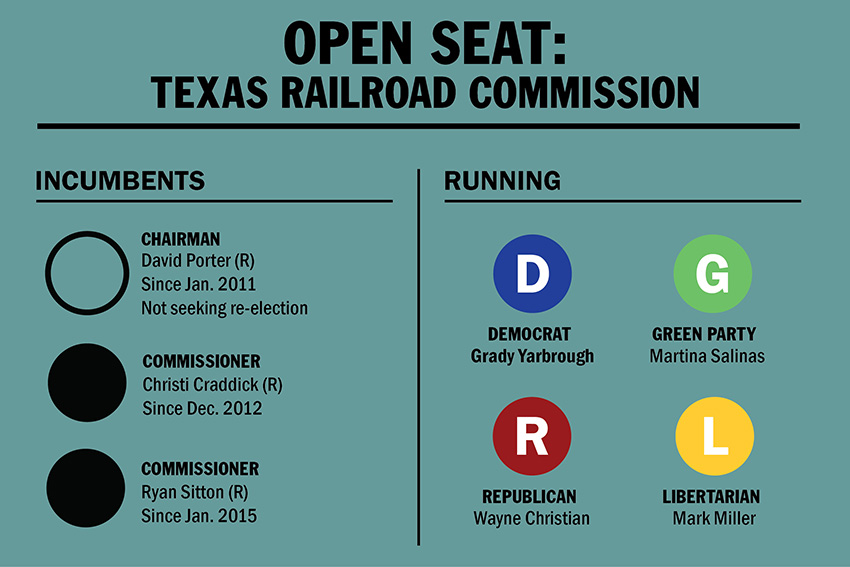Like every other statewide race, the bid for the open seat on the Texas Railroad Commission will likely go to the Republican candidate. At times, this leads to a state getting what it wants in a qualified conservative, as it did when Kay Bailey Hutchison won four different races for U.S. Senate starting in 1993. Other times, the result is the election of an unqualified partisan thanks to a hollow win in a primary race that got no attention, as would be the case should Texas elect Wayne Christian to the role of Railroad Commissioner.
Despite its misleading name, the Texas Railroad Commission actually regulates the oil and gas industry, not railroads. The price of oil has cratered since the last time this commission had a seat to fill, and its power to affect production in this state — and in the process international prices — makes it worthy of much broader attention.
The Republican candidate, Wayne Christian, in addition to missing debates, has very little experience in the industry and appears reluctant to carry out the responsibilities the job entails. He argued against any industry reform at a February candidate forum, saying, “We need to protect the industry.” At one point, he left the impression that he didn’t know that the commission regulated natural gas. With the vast majority of his fundraising coming from industry companies and employees, Christian should know better — but instead seems intent to do what is politically expedient instead of what his job should require.
The Democratic candidate is no better. Grady Yarbrough, a 79-year-old former schoolteacher, demonstrated his inability to hold this position when he failed to correctly answer questions about the duties it entails. When speaking to the Texas Tribune, he not only incorrectly attributed fracking to small earthquakes in Texas — wastewater injections, not fracking, have been implicated — but also proved to be so extremely partisan for the sake of appealing to Democrats that he did not properly address the issues that need attention from a Railroad Commissioner. Instead, his platform is based off of purely Democratic ideals, despite the fact that being a Democrat on a Texas ticket almost inevitably means a loss.
The undisputed best candidate in this race is Mark Miller, a former UT petroleum engineering professor who is running as a Libertarian. To assume Miller would slash regulation and hamstring the commission’s ability to do its job because he is a Libertarian would be a mistake, though. Ahead of his bid for the position, he wrote a 112-page book on it. Miller knows what the industry’s best practices are and wants to be a watchdog who ensures they get done.
He is not without his faults. Our ideal candidate would acknowledge the scientific consensus on climate change in a way that aligns with research. Although Miller says that earth is warming, he argues that the warming has plateaued and isn’t convinced human activity is the reason. He is wrong. What he does get right, though, is that we should try to limit the excess carbon dioxide we put into our atmosphere as well as find ways to plan for the impacts of climate change. He is in the acceptable boundary on climate for us — appeasing those on the right who want to protect the industry while working toward solutions that will fix real problems.
We proudly stand for progressive principles but understand that the way those are best achieved is not always immediate and easy. Miller would represent a strong step toward a rational railroad commission that cares about people instead of industry profits. We encourage a vote for him in this race.
















